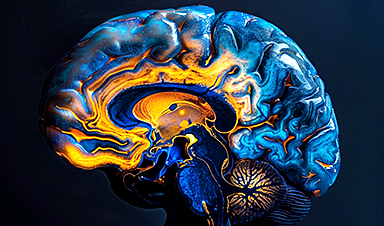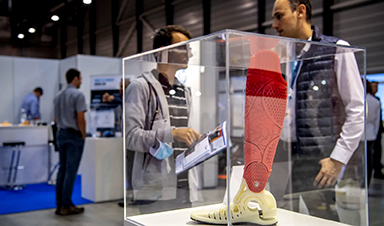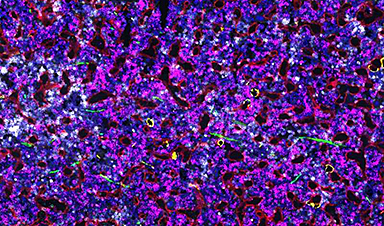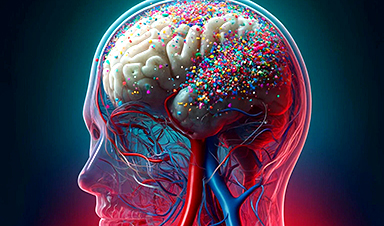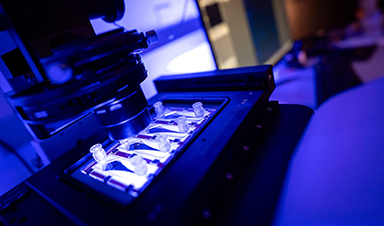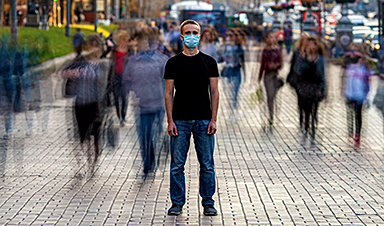The world’s largest study of the genetics of critical Covid-19, involving more than 57,000 people, has revealed fresh details about some of the biological mechanisms behind the severe form of the disease.
Some 16 new genetic variants associated with severe Covid-19, including some related to blood clotting, immune response and intensity of inflammation, have been identified.
These findings will act as a roadmap for future efforts, opening new fields of research focused on potential new therapies and diagnostics with pinpoint accuracy, experts say.
Researchers from the GenOMICC consortium — a global collaboration to study genetics in critical illness — led by University of Edinburgh in partnership with Genomics England, made these discoveries by sequencing the genomes of 7,491 patients from 224 intensive care units in the UK.
Their DNA was compared with 48,400 other people who had not had Covid-19, participants in Genomics England’s 100,000 Genomes Project and that of a further 1,630 people who had experienced mild Covid.
Determining the whole genome sequence for all participants in the study allowed the team to create a precise map and identify genetic variation linked to severity of Covid-19. The team found key differences in 16 genes in the ICU patients when compared with the DNA of the other groups.
They also confirmed the involvement of seven other genetic variations already associated with severe Covid-19 discovered in earlier studies from the same team.
The findings included how a single gene variant that disrupts a key messenger molecule in immune system signaling — called interferon alpha-10 — was enough to increase a patient’s risk of severe disease.
This highlights the gene’s key role in the immune system and suggests that treating patients with interferon — proteins released by immune cells to defend against viruses — may help manage disease in the early stages.
The study also found that variations in genes that control the levels of a central component of blood clotting — known as Factor 8 — were associated with critical illness in Covid-19.
This may explain some of the clotting abnormalities that are seen in severe cases of Covid-19. Factor 8 is the gene underlying the most common type of haemophilia.
Professor Kenneth Baillie, the project’s chief investigator and a Consultant in Critical Care Medicine at University of Edinburgh, said: “Our latest findings point to specific molecular targets in critical Covid-19. These results explain why some people develop life-threatening Covid-19, while others get no symptoms at all. But more importantly, this gives us a deep understanding of the process of disease and is a big step forward in finding more effective treatments.
“It is now true to say that we understand the mechanisms of Covid better than the other syndromes we treat in intensive care in normal times — sepsis, flu, and other forms of critical illness. Covid-19 is showing us the way to tackle those problems in the future.”
Professor Sir Mark Caulfield from Queen Mary University of London, formerly Chief Scientist at Genomics England and co-author on this study, said: “As Covid-19 evolves, we need to focus on reducing the number of people getting seriously ill and being hospitalised. Through our whole genome sequencing research, we’ve discovered novel gene variants that predispose people to severe illness — which now offer a route to new tests and treatments, to help protect the public and the NHS from this virus.”
Dr Rich Scott, Chief Medical Officer at Genomics England, said: “Strategically, we’re at a point where genomic science is becoming an integral part of the national infrastructure in routine healthcare. This study illustrates the value of whole genome sequencing to detect rare and common variants that influence critical illness requiring intensive care. It represents a major leap forward in our understanding of how our genetic makeup influences severe illness with Covid-19.”
“All those involved in the study went to great efforts to engage with all communities within the UK — including groups that have historically been under-represented in medical studies. The inclusive element of our work has generated meaningful results for everyone in the country.”
Lord Kamall, Minister for innovation at the Department of Health and Social Care (DHSC), said: “Clinical research has been vital in our fight against Covid-19 and the UK’s innovation is enabling us to transform our health service and ensure the NHS is able to deliver world-class care.
“This research is an important step forward in better understanding how Covid-19 impacts certain people, allowing us to take the necessary action to protect the most vulnerable and save lives.”
The findings have been published in Nature.
GenOMICC (Genetics of Susceptibility and Mortality in Critical Care) started in 2015 as an open, global consortium of intensive care clinicians dedicated to understanding genetic factors influencing outcomes in intensive care from diseases such as SARS, flu and sepsis.
The consortium is led by the University of Edinburgh, and since 2020 it has been focused on Covid-19 research in partnership with Genomics England and in collaboration with NHS Lothian, the Intensive Care National Audit and Research Centre (ICNARC), and Queen Mary University of London.
The ground-breaking 100,000 Genomes Project was established in 2014 to sequence 100,000 genomes from people with a rare disease or cancer. The Project was completed in 2018 and paved the way for the creation of a new genomic medicine service for NHS England, transforming patient care by bringing advanced diagnosis and personalised treatments.
News
Millions May Have Long COVID – So Why Can’t They Get Diagnosed?
Millions of people in England may be living with Long Covid without even realizing it. A large-scale analysis found that nearly 10% suspect they might have the condition but remain uncertain, often due to [...]
Researchers Reveal What Happens to Your Brain When You Don’t Get Enough Sleep
What if poor sleep was doing more than just making you tired? Researchers have discovered that disrupted sleep in older adults interferes with the brain’s ability to clean out waste, leading to memory problems [...]
How to prevent chronic inflammation from zombie-like cells that accumulate with age
In humans and other multicellular organisms, cells multiply. This defining feature allows embryos to grow into adulthood, and enables the healing of the many bumps, bruises and scrapes along the way. Certain factors can [...]
Breakthrough for long Covid patients who lost sense of smell
A breakthrough nasal surgery has restored the sense of smell for a dozen long Covid patients. Experts at University College London Hospitals NHS Foundation Trust successfully employed a technique typically used for correcting blocked nasal passages, [...]
Scientists Invent Plastic That Can Dissolve In Seawater In Just A Few Hours
Plastic waste and pollution in the sea have been among the most serious environmental problems for decades, causing immense damage to marine life and ecosystems. However, a breakthrough discovery may offer a game-changing solution. [...]
Muscles from the 3D printer
Swiss researchers have developed a method for printing artificial muscles out of silicone. In the future, these could be used on both humans and robots. Swiss researchers have succeeded in printing artificial muscles out [...]
Beneficial genetic changes observed in regular blood donors
Researchers at the Francis Crick Institute have identified genetic changes in blood stem cells from frequent blood donors that support the production of new, non-cancerous cells. Understanding the differences in the mutations that accumulate [...]
Shocking Amounts of Microplastics in the Brain – It Could Be Increasing Our Risk of Dementia
The brain has higher concentrations of plastic particles compared to other organs, with increased levels found in dementia patients. In a comprehensive commentary published in Brain Medicine, researchers highlight alarming new evidence of microplastic accumulation [...]
Baffling Scientists for Centuries: New Study Unravels Mystery of Static Electricity
ISTA physicists demonstrate that contact electrification depends on the contact history of materials. For centuries, static electricity has intrigued and perplexed scientists. Now, researchers from the Waitukaitis group at the Institute of Science and [...]
Tumor “Stickiness” – Scientists Develop Potential New Way To Predict Cancer’s Spread
UC San Diego researchers have developed a device that predicts breast cancer aggressiveness by measuring tumor cell adhesion. Weakly adherent cells indicate a higher risk of metastasis, especially in early-stage DCIS. This innovation could [...]
Scientists Just Watched Atoms Move for the First Time Using AI
Scientists have developed a groundbreaking AI-driven technique that reveals the hidden movements of nanoparticles, essential in materials science, pharmaceuticals, and electronics. By integrating artificial intelligence with electron microscopy, researchers can now visualize atomic-level changes that were [...]
Scientists Sound Alarm: “Safe” Antibiotic Has Led to an Almost Untreatable Superbug
A recent study reveals that an antibiotic used for liver disease patients may increase their risk of contracting a dangerous superbug. An international team of researchers has discovered that rifaximin, a commonly prescribed antibiotic [...]
Scientists Discover Natural Compound That Stops Cancer Progression
A discovery led by OHSU was made possible by years of study conducted by University of Portland undergraduates. Scientists have discovered a natural compound that can halt a key process involved in the progression [...]
Scientists Just Discovered an RNA That Repairs DNA Damage – And It’s a Game-Changer
Our DNA is constantly under threat — from cell division errors to external factors like sunlight and smoking. Fortunately, cells have intricate repair mechanisms to counteract this damage. Scientists have uncovered a surprising role played by [...]
What Scientists Just Discovered About COVID-19’s Hidden Death Toll
COVID-19 didn’t just claim lives directly—it reshaped mortality patterns worldwide. A major international study found that life expectancy plummeted across most of the 24 analyzed countries, with additional deaths from cardiovascular disease, substance abuse, and mental [...]
Self-Propelled Nanoparticles Improve Immunotherapy for Non-Invasive Bladder Cancer
A study led by Pohang University of Science and Technology (POSTECH) and the Institute for Bioengineering of Catalonia (IBEC) in South Korea details the creation of urea-powered nanomotors that enhance immunotherapy for bladder cancer. The nanomotors [...]


